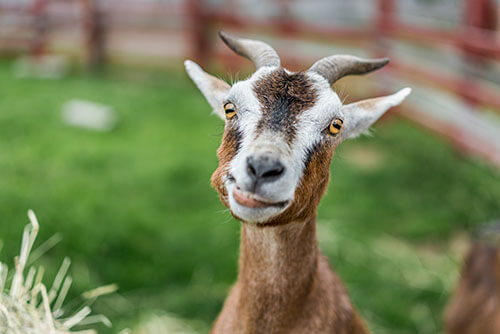Goats and Ammonia
Jan 04, 2021

From our vendor partners, Manna Pro
Successful goat owners understand it takes a lot of hard work and dedication to keep goats happy and healthy. While it is common knowledge to provide them with plenty of shade and lots of fresh clean water, often owners can overlook the need to address a less obvious, but stinky, hazard to their goats’ health and overall well-being.
Of course, we are speaking of none other than that prevalent, noxious, and harmful substance called ammonia. Indeed, all creatures, even cute playful ruminant ones such as goats, produce ammonia (which occurs as urine breaks down). And ammonia and other waste odors aren’t just an irritating assault on the nostrils; more critically, they pose a serious health risk. Providing your goats with more pure and healthy air to breathe is really just as important as giving them nutritious food, fresh water, and clean shelter. Ammonia predisposes your goats to pneumonia and damages their lungs and respiratory systems. Keeping viral and bacterial infections out of the lungs starts with removing harmful levels of ammonia from your goats’ barn—a process that can be very easy with just a little attention to detail.
Maintaining your goats’ respiratory health requires a consistent barn maintenance program as well as a well-ventilated barn. Because our beloved goats tend to be vertically challenged, compared to many of their fellow ruminants, they are closer to the ground, where ammonia is even more prevalent and dangerous to breathe. It becomes a problem for them before you know it is even an issue. To understand this, simply kneel down in your goat shed; if you can smell ammonia from eight inches above the floor, then it is already affecting your goats’ respiratory systems.
Providing adequate cross-ventilation is just one piece of the puzzle when you are looking to eliminate ammonia odors from your pens and sheds. Keeping your goats’ bedding clean and dry also plays a crucial role in keeping ammonia levels in check. Consider adding Healthy World Pet Deodorizer™ powered by Sweet PDZ to the wet spots in your goat barn. This all-natural, nontoxic product has been proven to capture, neutralize, and eliminate harmful levels of ammonia and other odors. Plus, it keeps your bedding material performing better. Healthy World and Sweet PDZ products contain no masking scents or perfumes and safe for use with all pets and livestock.
If you smell ammonia in your goat pens, you have more than an odor problem—you have a health problem. Providing safe and healthy air for your goats is essential for their overall well-being. Keep your goats healthy and eliminate the harmful effects of ammonia by adopting a proper barn management program and putting the best-performing products to use.
Raising goats can be an enjoyable and rewarding venture; make sure not to overlook barn/pen hygiene and maintenance while doing all you can do for their health and happiness.